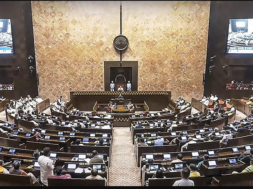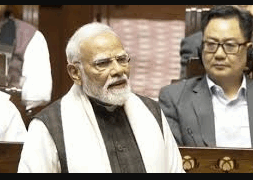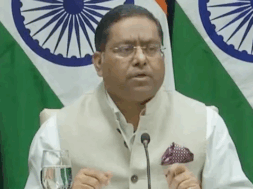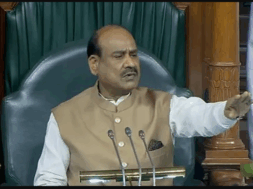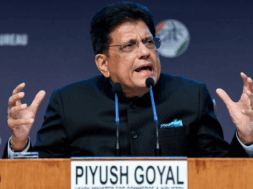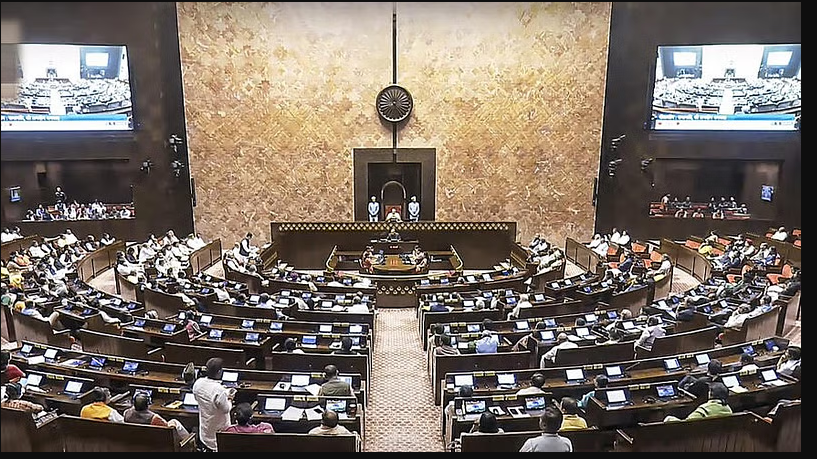
Manas Dasgupta
NEW DELHI, Apr 3: After the Lok Sabha passed the Waqf Amendment Bill by 288 votes to 232 after more than 10 hour long debate that continued well past midnight on Wednesday, the bill was introduced for adoption in the Rajya Sabha on Thursday where the heated exchanges were continuing on the same political line as in the lower House.
The Minority Affairs Minister Kiren Rijiju, who had intruded the bill in the Lok Sabha, also piloted it in the Upper House on Thursday after the conclusion of the Question Hour. The Budget Session of the Parliament will conclude on Friday.
The Leader of the Upper House, the Union Health minister JP Nadda, accused the Congress of making Muslim women second-grade citizens during its rule at the Centre. Participating in a debate on the Waqf bill, Mr Nadda said the Narendra Modi government brought Muslim women into the mainstream by banning the practice of triple talaq.
“You made the Indian Muslim ladies second-grade citizens,” Mr Nadda said. While triple talaq was banned in Muslim countries such as Egypt, Sudan, Bangladesh, and Syria several years ago, the Congress-led UPA government did nothing for Muslim women while it was in power for a decade. He said the sole purpose of the Waqf bill was to bring reforms in managing the Waqf properties and was in the nation’s interest.
The BJP leader Brij Lal said the entire Delhi, including the Parliament building, would have been Waqf property had the UPA government been in power. He said all Waqf properties should be investigated.
Opposing the bill, INDIA bloc MP Kapil Sibal highlighted that Waqf property, as per law, belongs to God and cannot be sold. It can be donated for religious purposes or to schools and shelters, whereas a trust to be formed under the amended act can sell properties.
Outside Parliament, the Shiv Sena (UBT) chief Uddhav Thackeray said the “concern” shown by the BJP and its allies for Muslims during the discussion on the Waqf Amendment Bill would put Pakistan founder Muhammad Ali Jinnah to shame. The Jammu and Kashmir Grand Mufti said the Waqf bill was a “betrayal of Muslims.”
Mufti Nasir-ul-Islam, the Grand Mufti of Jammu and Kashmir, said the Waqf Amendment Bill was against Muslims and constituted a “betrayal” of the community. “Because of this betrayal, there is chaos among them… We have decided to go to the Supreme Court. Considering the sentiments of the Muslims, it should be noted that 232 members were against it,” he said.
Meanwhile, the BJP has sought an explanation from their members who were not present during voting on the Waqf Amendment Bill in the Lok Sabha on Wednesday. One MP and a Union Minister were asked why they were missing yesterday.
Naveen Patnaik’s Biju Janata Dal apparently had a change of heart about the Waqf Amendment Bill. After categorically saying it was against the bill ahead of its presentation in the Lok Sabha, the party, shortly before the voting in the Upper House, has tweaked its stand. In a post on social media platform X, senior party leader Sasmit Patra announced that there would be no party whip this time.
“The Biju Janata Dal has always upheld the principles of secularism and inclusivity, ensuring the rights of all communities. We deeply respect the diverse sentiments expressed by different sections of the Minority communities regarding the Waqf (Amendment) Bill, 2024,” his post read.
“Our Party, having taken these views into careful consideration, has entrusted our Hon’ble Members in the Rajya Sabha with the responsibility of exercising their conscience in the best interest of justice, harmony and the rights of all communities, should the Bill come up for voting. There is no Party Whip,” he added.
This is the first instance of a non-aligned party breaking ranks with the parties opposed to the bill. Tamil Nadu’s opposition AIADMK and YS Jaganmohan Reddy’s YSR Congress are so far standing firm.
But even including them, the government has an edge in terms of numbers in the Rajya Sabha. Of the current strength of 245 MPs, the NDA has 125 – five more than the opposition and should not confront any problem for the passage of the bill.
Opening the gates for “voting on conscience” can only add to the government’s strength. The BJD has seven members in the Rajya Sabha. The BJD has always maintained what it called “equal distance” from the BJP and the Congress, but was known for providing “issue-based support” to the BJP in the past in cases of contentious bills in parliament.
The situation, though, changed after last year’s general and state elections. Mr Patnaik’s party, which had been ruling the state for three decades was decimated in the hands of the BJP and failed to win any seat in the Lok Sabha. The BJP won 20 of 21 Lok Sabha seats and 78 of 147 assembly seats in Odisha. Shortly after, Mr Patnaik made it clear that the BJP can no longer count on their support in parliament.
During Prime Minister Narendra Modi’s reply to the Motion of Thanks to the President’s address during the inaugural session of parliament after the election, the BJD’s nine MPs joined the Opposition walkout over his remarks on Congress’s Sonia Gandhi.
The party also tweaked its stand on the “One Nation One Election” – which it once supported – called for the “fine print” of the proposal of the Kovind Committee adopted by the Union cabinet and suggested that the matter not be rushed like the farm laws.
Meanwhile, Senior Janata Dal (United) leader Mohammed Qasim Ansari resigned from the party in protest over the Bihar Chief Minister Nitish Kumar-led party’s support for the Waqf Amendment Bill, saying it “goes against our principles.
